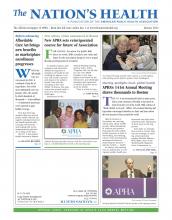Nearly 75 percent of U.S. adults have no plans that direct their medical care at the end of their lives, according to a recent study.
A lack of awareness was cited as one of the main reasons why so many Americans do not have end-of-life care plans, especially among black and Hispanic Americans, according to research published online in December in the American Journal of Preventive Medicine.
End-of-life care includes the use of an advance directive. An advance directive is a legal document, such as a living will, outlining what type of medical treatment a person does or does not want in the event she or he dies or is incapacitated. Only about 26 percent of adults reported having one.
The data came from almost 8,000 adults among the 2009 and 2010 Porter Novelli HealthStyles surveys, said study co-author Jaya Rao, MD, MHS, deputy editor of the Annals of Internal Medicine. Rao conducted the research as an associate professor in the Division of Pharmaceutical Outcomes and Policy at the University of North Carolina at Chapel Hill’s Eshelman School of Pharmacy.
Participants answered a series of questions, such as whether they had discussed what treatments their family members requested in the event of death or illness, and if they had an advance directive.
People who were more likely to have end-of-life care plans were older adults with more education and higher incomes. They were also more likely to have a chronic disease and regular health care, the study said. Advance directives were more common among whites and less common among blacks and Hispanics, regardless of education level, the study said.
Additionally, 68 percent of people younger than 54 were less likely to have an advance directive, while almost 32 percent of participants 55 and older said they did not have one, the study said.
“That is surprising,” Rao said of the older adults. “Most people at that age have at least one chronic disease.”
Rao, a former medical epidemiologist at the Centers for Disease Control and Prevention’s Healthy Aging Program, said there need to be communication strategies tailored toward blacks and Hispanics on the importance of end-of-life care. She also said physicians need tips on how to start this conversation with their patients, because patients want to receive this information from their physicians.
“Many physicians are uncomfortable with discussing these issues or they may just not have the time,” Rao told The Nation’s Health. “So tools that can be incorporated into the health care system would be useful to get the word out.”
Rao said she would like to get several years worth of data to see if there are trends or changes in the percent of the U.S. population that creates end-of-life care plans. She said she would also like to see questions about end-of-life care included on national surveys, such as CDC’s Behavioral Risk Factor Surveillance System and the National Health Interview Survey.
For more information on the study, visit http://www.ajpmonline.org/webfiles/images/journals/amepre/AMEPRE_3917-stamped-121013.pdf.
- Copyright The Nation’s Health, American Public Health Association









